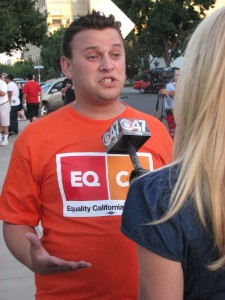
In ruling that Proposition 8 violates the U.S. Constitution, a federal judge made it clear that Proposition 8 was motivated by a fear and hatred of same-sex couples. Proposition 8 was indeed Proposition H8 (Hate).
Chief Judge Vaughn Walker of the Northern District of California overturned Prop 8 on August 4 on two grounds: it denies individuals the fundamental right to marry without a compelling reason to do so, violating the due process clause of the federal constitution, and because it violates the equal protection clause by discriminating based on sex and sexual orientation.
The judge’s ruling was not unexpected, even by the Yes on 8 proponents. When Judge Walker heard evidence in the case earlier this year, the proponents essentially argued that marriage was traditionally between a man and a woman and failed to refute the evidence called by the plaintiffs.
Under both the due process clause and the equal protection clause, whether a law is constitutional comes down to whether the state has a good enough reason for it. So, the core of Judge Walker’s opinion were his factual findings—the determinations he made based on the evidence presented to him at trial. The opinion relied on the trial testimony of the plaintiffs and their expert witnesses to conclusively refute every argument ever advanced against permitting same-sex couples to marry.
Judge Walker ruled that Proposition 8 and laws like it cannot withstand constitutional scrutiny even under the most forgiving legal standard, the “rational basis” test. But he also held that because it discriminates based on sexual orientation, Proposition 8 should be evaluated under the “strict scrutiny” standard —the highest level of constitutional scrutiny, which applies to laws that discriminate on the basis of race. Discussing the way that the law discriminates based on both sex and sexual orientation, he explained that excluding same-sex couples from marriage is “an artifact of a time when the genders were seen as having distinct roles in society and in marriage.” And “[t]hat time has passed.”
Judge Walker initially temporarily stayed the ruling, which meant that it would not go into effect immediately. Then, on August 12, he lifted the stay, allowing marriages to begin on August 19—unless a higher court intervened. The Yes of 8 supporters filed an emergency appeal to the Ninth Circuit Court of Appeals the following day.
The big question on appeal is whether the Proposition 8 proponents have legal standing. The defendants in the case were the State of California, the governor and various state officials—all of whom chose not to defend themselves against the lawsuit. U.S. Supreme Court precedent comes down on the side of not allowing initiative proponents to appeal adverse lower court decisions. In this case, because the proponents cannot show actual injury, it is likely they do not have Article III standing and cannot appeal. Imperial County attempted at the last minute on August 4 to intervene in the case to provide an avenue for the proponents to appeal, but Judge Walker denied the county’s motion at the same time he ruled that Prop 8 was unconstitutional.

